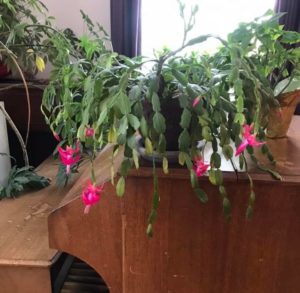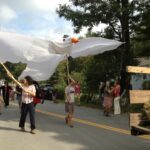Greetings!
As I have been thinking about what to write about to make good use of this space in the Whistler, I flipped through a mental rolodex of the challenges in our world that have caught my attention lately. Thinking about geo-political machinations, the separation of children from their parents by inhumane interpretation of our country’s immigration policies, our culture’s struggle with guns and how to best balance our love of liberty with our vision of a world in which children can go to school without fearing deadly violence … well, as you can see, when I head down the “what is currently heartbreaking in our world” list, it can become overwhelming and paralyzing. In fact, when I focus on what is wrong and desperately needs fixing in the world, I can become entirely stuck, which renders me unable to do anything about any of it. Does that happen to you sometimes?
I have a practice of reading each morning, and one of my favorite things to read is the daily emails from Father Richard Rohr’s “Center for Action and Contemplation.” Rohr is a well known Franciscan brother, a Christian writer who acknowledges that Truth comes in many forms and is available to people following a variety of spiritual paths. From their website, here’s what the CAC is about:
The Center for Action and Contemplation supports a new reformation—from the inside—
*In the spirit of a Cosmic Christ
*Confirming people’s deeper spiritual intuitions
*Encouraging actions of justice rooted in prayer
*With a new appreciation for, and cooperation with, other denominations, religions, and
cultures
In his recent series of writings on the topic of vocation, Rohr included this passage:
Archimedes (c. 287—c. 212 BC), a Greek philosopher and mathematician, inspired the familiar aphorism, “Give me a place to stand on, and I will move the whole earth with a lever.” Our fixed point—the place upon which we stand as our True Self—is steady, centered, poised, and rooted. To be contemplative, we have to have a slight distance from the world, to allow time for withdrawal from business as usual, for going into what Jesus calls “our private room” (Matthew 6:6). However, in order for this not to become escapism, we have to remain quite close to the world at the same time, loving it, feeling its pain and its joy as our pain and our joy. So the fulcrum, the balancing point for our lever, must be in the real world.
(Adapted from Richard Rohr, Dancing Standing Still: Healing the World from a Place of Prayer (Paulist Press: 2014), 6, 80-82.)
In a world that bombards us with reasons for despair, it is so critical to ask ourselves, “What is my lever?” For Christians, the answer will likely have something to do with the love and lessons of Jesus Christ.
Our congregation is a small one. In our attempt to follow the way of Jesus – the way of compassion and peace and love for all of creation – we feel called to address the needs of the world. We try to address all manner of injustices, and we write letters, and we join in marches and boycotts. We can sometimes feel overwhelmed and exhausted in our constant effort to move the world. Rohr reminds us that we need a lever. We need a still point. We need quiet, truth, beauty, and openness to others. Just constantly shoving at a world that doesn’t want to move is an exercise in exhaustion, leading to burnout.
I’m glad our congregation also offers still points. Worship at 10 am on Sundays is one. Silent Meditation (with no particular religious focus) in our sanctuary on Sundays at 5:30 and quarterly labyrinth walks are two others. If you’re in search of a still point, a lever with which to move the world, you should consider joining us in these endeavors, regardless of your religious tradition. (We’re a very welcoming bunch and love to learn from others!) In our broader community, some still points might include Pinnacle walks, birding adventures, garden time, coffee breaks, painting and poetry, knitting, meditation, and so much more.
What is your lever?
In peace,
Susie


